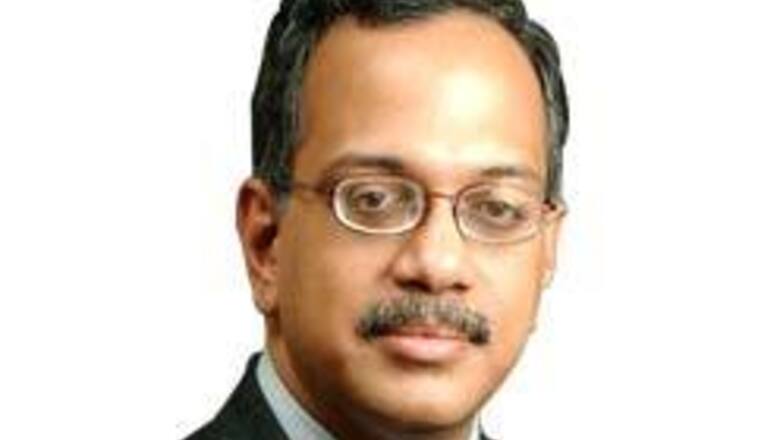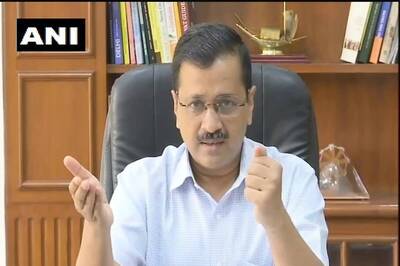
views
A clear and decisive verdict from Karnataka's electorate would bring political stability and help business too, says Anand Sudarshan, MD and CEO of Manipal Education.
Shashidhar: If you were heading the government, can you list the priorities and the goals for the next 10 years growth?
Anand Sudarshan: Shashidhar, my priorities will be education for all, sustainable economic growth (given the amount of environmental damage we are causing), and building a fair society that is founded on equity and merit. I believe these three (I limited myself to three) priorities will address many (if not most) of the challenges we face today.
Potineni Gopalakrishna: I think commitment to cause is more important than stability. Let us go back down the memory lane and recollect how Hegde's minority government performed. I think to a certain extent, in recent times, HDK-led government worked satisfactorily. Please comment.
Anand Sudarshan: Gopalakrishna, you are correct. Commitment to cause, supported by a foundation of ethical behaviour in supporting / being a part of / being in the opposition of coalition governments is far more important than just a majority. I don't see the former happening too easily, it might be higher probability of getting good government if we had a majority government, I think.
PMN: Can we expect some development done in the Mumbai and Hyderabad-Karnataka regions?
Anand Sudarshan: I hope so, I have mentioned in my earlier replies the importance I place to overall development of the state - North and North-west Karnataka are certainly a part of it.
SP: Where will the growing inflation stop? The spending / purchasing power of the middle class has increased. What is your suggestion to the new government to cope up with the current scenario?
Anand Sudarshan: Inflation, unfortunately, is currently a global phenomenon - its driven by high energy (oil) costs, sudden increase in food grain costs due to lower availability, and also higher costs of several other things like metals and cement. Controlling inflation quickly is a key task of the government at the centre (which, of course, being a coalition government with outside support, is getting pulled all around), and I hope they are able to make an impact quickly.
PAGE_BREAK
PMN: Can you trust the new government will get classical language status for Kannada?
Anand Sudarshan: Kannada is a beautiful language with a hoary past. While I don't know much first-hand about the amount of classical works, many of my close friends do and they are all of the strong opinion (not all of them are Kannadigas, so this is not a partial view) that Kannada deserves a classical language status. Let's hope the new government does its bit in making it happen.
Karunakar: Will water dispute between the states will be resolved by the new government?
Anand Sudarshan: I think they will try, and I do hope they arrive at a resolution. Best that we can probably achieve is significant progress. We have had disputes on water dating back to decades; I don't expect all of them to get resolved immediately. But one or two in the next 12 months, will be a great start.
Sri: The proposed CVT on the property does have an impact on the middleclass citizen. Don't you think we need to scrap this?
Anand Sudarshan: I don't know enough about this subject to answer, my apologies.
Dilip Sadarangani: With the creaking infrastructure and the relentless entry of migrants in to Bengaluru, what positive outcome do you see for the city whilst both parties can not afford to antagonise the rest of Karnataka in the battle of Bengaluru Vs RoK (Rest of Karnataka). Would you still recommend Bengaluru ahead of Mysore, Mangalore, Hubli et al? Also, what lies ahead in case there is a hung verdict at the hustings?
Anand Sudarshan: Our infrastructure has moved from 'creak' to 'groan' to 'last gasp' in many parts, unfortunately. But the charm of the state and the opportunities it provides continues to invite more and more in. The way I see it, there is no Bengaluru or RoK - I look at only ToK (There's One Karnataka). As I replied to one of the earlier questions, only all-round development of the state is the answer. And, the one thing I dread is, a hung verdict!
Balakrishna Rao: If there is a MoU to run the government for minimum of five years, should there be a fractured mandate with whatever justified equation on power sharing. There is no confidence on the bunch of politicians running the government with vested interests. What do you think?
Anand Sudarshan: That’s an interesting idea but probably not feasible under the current electoral system in India. However, I don't think we should blame only the politicians, all of us have a role to play. Let's hope we elect a government this time around with a majority (and let's hope that the majority lasts for a full term, without engineered defections!)
Lt Col Krishnan C: Don't you feel after this many years of freedom and variety of "promising" politicians in power, we have pathetically failed even to get a local electric train run between two famous cities like Bangalore and Mysore?
Anand Sudarshan: If that's the case, it's indeed a pity. I think we have disappointed ourselves in many areas in infrastructure. I hope the coming government recognises it, and starts being accountable for it (and accountability should not wait till the next elections come along!)
PAGE_BREAK
Rajesh P K: Is there any solution to the infrastructural bottlenecks being faced by Bangalore in particular? Can education and training play a part along with the government in resolving these issues by providing an in-depth research on infrastructure, comparative analysis with other countries in a similar growth stage, and providing training to the people involved?
Anand Sudarshan: There are plenty of solutions. Not all of them will be acceptable to all, but all of them are implementable, if there's political and execution will. Education and training can certainly play a part, and so can research. Government should and I am sure will reach out to academic institutions for research and inputs. What I will be looking forward to is them carrying it to the next step and actually implementing it within reasonable timeframes. Our problem, I have mostly found, is not lack of ideas - it's agreeing, and implementing after that.
Beluru Sudarshana: What is your opinion on lifting the ban from production and sale of ARRAC by the new government?
Anand Sudarshan: Unfortunately, I don't know enough about that subject to answer. My instinct as an individual, says promotion of arrack sales is at the end of the day detrimental to the populace. One could argue that not legally permitting arrack only results in spurious country liquor, but I would argue for better policing.
Sundar Rajan: The new government should be corruption free. What do you think? Will they make a promise to the electorate and resolve all outstanding issues with the neighbouring states on a give and take basis?
Anand Sudarshan: Honesty and cleanliness in politics and governance is what all of us hope for. I don't expect it to happen overnight though, but for me, hope springs eternal. On the subject of resolving issues with neighbouring states, I certainly hope they do, and make it as one of their key priorities.
Sri: What is you opinion on having connectivity flights between the two airports?
Anand Sudarshan: I don't think it's workable, will probably be cost-prohibitive except for those who can afford it. No, I think the answer is more grounded — the state government has an immediate responsibility in fixing connectivity between the various parts of Bangalore and the new airport. From what I have been reading in the papers, all stakeholders seem to be focusing on it. I will wait for May-end when the new airport opens, and then form my view!
Sri: Will NICE project be completed in this term of the government?
Anand Sudarshan: It would indeed be nice if it were to happen! I have driven down that road (the sections that are ready), and it's a pleasure. And it would improve, from what I understand, connectivity in many parts. I hope it happens.
R Srikanthan: Don’t you think one more government without absolute majority will take this state down in the country's list?
Anand Sudarshan: If there's one more coalition government without adherence to basic principles of responsibility and accountability, indeed this might be the case!
PAGE_BREAK
Lt Col Krishnan C: With the mixture of parties, first of all, do we expect a government in Karnataka this time with an absolute majority to whom Karnataka inc can propel our needs so that some tangible result can be expected?
Anand Sudarshan: I pray to the almighty that we get a government which has a majority, and is able to focus its attention on governing the state, and not get distracted by saving their seats. We the citizens have a role to play in this regard. We should get out and vote, and play our part in making sure a government with majority is elected. Having said that, fractured mandate is a potential feature of democracy — even if there's one, we should pray for basic ethics in formation of coalition governments.
Vishvesh: Can the new government ensure seats in school and professional courses based on merit and economic condition and not based on caste. In years to come, the backward caste and other caste enjoying the reservation would be forward caste and the forward caste would then be backward in all aspect. Isn't it right to provide admission to economically weaker section (irrespective of caste)?
Anand Sudarshan: Reservation is a central subject. The state government will have limited role to play in introducing economic criterion-based reservation of seats. It will have to be done over and above the mandated reservation. And even if they try, it is not likely to get any political traction. I believe the state government can approach this in another way, i.e. through scholarships and assistanceships (and soft long-term loans) for all students from economically weaker sections. That would be a great help.
Dr Nagasampige: Most of our universities lack basic infrastructure, as a result of which, students who pass out from such universities would struggle hard to get into industry. Previous government did not do any remarkable achievement in terms of higher education in the state. Could we expect any significant changes from the new government?
Anand Sudarshan: You are correct; there is a lack of even basic infrastructure in many educational institutions. I think the state government will probably have to put primary and secondary education focus a little bit ahead of higher education, to start with. In the Higher-Ed segment as well, I think the new government can do a lot - including de-politicising leadership appointments, working on a strong focus on academic excellence in all institutions, bringing back the research focus that has distinguished Bangalore (in particular) from all other cities in India, etc. I certainly expect that of the new government!
PAGE_BREAK
Pavanaja: The IT policies of the state government are aimed at promoting export only. While this is no doubt needed, the policy is detrimental for the growth of SMEs towards local software service and product developments. For example, there is no tax on earnings on software exports whereas there is 12.5% VAT on local s/w sales and service. Don't you think this is a wrong policy?
Anand Sudarshan: I absolutely agree with you. This is not just a state government policy, but a central government policy approach as well thus far. The time has come for a more balanced approach and I see IT playing a key role in India developing and growing further. I believe there have to be a several incentives at play for IT investment, which is domestic focused - perhaps Karnataka could start with re-looking at its VAT policy.
Ramanujam Sridhar: There is always this great urban-rural divide and people think that if you are pro-Bangalore development, you are against the development of rural Karnataka. Are they mutually exclusive?
Anand Sudarshan: Very good question. I don't think they are mutually exclusive at all! While rapid urbanisation is a reality, the urban and rural sector are inextricably linked; we cannot look at one and not at the other. Many of the perceptions people have today have probably been created through strong political stands some of our leaders have taken. Individually, all of us citizens - rural and urban - should stand up to not falling for such an artificial differentiation. We should be prepared to accept developmental policies that would necessarily have to divide limited resources to both sides. We have to learn to take opportunities to the semi-urban and rural areas (and the industry has a big role to play here), and work on a sustainable model of statewide development. I look forward to the coming and future government's approaching their responsibilities in this fashion - however like I said before, this may be another big task!
PAGE_BREAK
Sandeep: Can the new government give free power to farmers in the present situation? What about Bangalore metro project?
Anand Sudarshan: I am not an expert in the power sector, so I am not able to comment with any authority. I will say, however, that the onus will be on the new government to ensure that they balance out legitimate needs of the farmer (in particular, those who are not well-off and those who's livelihood has been deeply affected by several challenges to the agrarian sector), and prudence in managing the state's finances. Given that the farmers of our and other states are our anna dhatas, I would be strongly in favour of all policies that help them stand on their feet (and such policies include not only power, but also cutting the stranglehold the middlemen have on farmers, etc). As to the Metro project, I live in Bangalore and I know like me many Bangaloreans are proud that the Metro is coming to our city, and look forward to its success. Like Mr Sridharan did in Delhi, I look forward to our metro also getting completed on time, and running spotlessly; it will an important (albeit small) contribution to our city's struggling infrastructure limitations being relieved.
Saurav Mishra: Why does caste politics play an important role in a cosmopolitan city like Bangalore?
Anand Sudarshan: There is a big difference between generations which were built on a political structure honed through struggle (independence first, and nation-building next), and one that's exposed to a polity that's power-focussed. In times like these, 'political segmentation' akin to market segmentation, is the order of the day for political parties - indeed, they cannot escape this electoral math. I believe it's up to the ordinary citizen - you and me, and the countless others - to play the moderating role of making such segmentation meaningless. We need to educate each other, and make sure that within our influence circle, we promote thoughts of harmony and progress. This perhaps sounds a bit like Gandhigiri, but I truly believe this is workable.
V S Ramakrishnan: What can TN expect from Karnataka — amicable solution to Hogenakkal?
Anand Sudarshan: I am not sure I should answer this question :-) What I can say for sure is that a calm approach to solving this problem is essential keeping in mind the principle of fairness and give-and-take. I look forward to the new government achieving it with the TN government, although I think this is a 'big-ask' for them.
Devesh Chaturvedi: Why is the young generation not getting into politics? We still see the same old faces from last couple decades with no ethics or loyalty. Rapidly changing face of India needs fresh-thinking politicians. If you agree, how can education help to bring this change?
Anand Sudarshan: That’s a very valid question. One of the redeeming sights I have personally had over the last two years, is meeting and interacting with a number of young politicians - I believe that their numbers are a lot more than before, and I am actually quite enthused and optimistic about the future, after interacting with them. To be sure, many of them belong to the dynastic politics spectrum - but they are all committed, bright, and with a strong vision for tomorrow's India. I look forward to many more from the younger generation to join this brigade. And I fully agree that education (and educational institutions) have a role to play. Many of the earlier generation of young politicians were groomed through student politics from campuses, which has either disappeared, or degenerated in many places with money and muscle power. I think it is definitely possible for a different approach to be ushered in, and educational institutions have a role to play.
PAGE_BREAK
Aamit: State governments have been trying to get the "Metropolitan City" status for Bangalore. How far has it been achieved or do you think the next government will do a better job?
Anand Sudarshan: I am not fully sure what the Metro status will achieve for Bangalore (besides higher DA and CCA for government employees) - if there are tangible benefits besides bragging rights, certainly it's one of the areas the new government ought to focus on.
Sheetal Gopal: What policy changes do you think will trigger further development in the IT sector. Will new government be in a position to implement the same?
Anand Sudarshan: The IT sector needs to actively move away from a Bangalore-centric strategy, to one that reaches out to several other parts of Karnataka (this is particularly true with the changing global climate and the weakening US dollar). This is not new. Places like Mysore and Mangalore have been under development for a while. However, this needs to be accelerated manifold. All policies that would aid this would help the IT industry greatly.
Amir: I am looking forward to SM Krishna being next CM as he can start things from where he left. I was totally inspired by Bangalore’s growth at that time and even dropped a job offer from US. But last 2-3 years have been so static that I am getting sick of infrastructure and basic amenities problems in Bangalore. Do you think Krishna can make the difference?
Anand Sudarshan: Whoever comes to power, they have a deep responsibility in restoring Karnataka's rightful place among the leading states of India. And to view Karnataka as only Bangalore, or Karnataka sans Bangalore - both constitute limited and damaging perspectives. I look forward to the next CM and his/her team focusing forward, including infrastructure in Bangalore.
Shashidhar Matada: In this political scenario, where the political parties have no majority, all politicians are turning into real estate agents, brokering business, 30 per cent of them are criminals elected as law makers, None of them have any experience of governance. None of them has a vision of 20 -30 years growth, no policy is implemented and transparent to the public, no law holds good to check the lawlessness of the governing body including the ministers and respective bureaucracy. How do you expect the government to work like a corporate? How does the private sector consortium, which contributes in majority to the employment and wealth generation, make these politicians work? Can the private sector define infrastructure, IT, health, law etc by coming together and form the policy for next generation say 20 - 30 years, not just Bangalore but by identifying all locations in Karnataka?
Anand Sudarshan: I share your frustration at the relatively low quality of some of the polity and governance in states. And certainly private sector has a key role to play. However, in addition to the private sector, there are other stakeholders involved - it would be unreasonable (and unrealistic) to expect private sector alone to form policy for next generation. Private sector should take a pledge that they will not resort to unethical practices, for example - unethical practices sustain many of the problems you have highlighted; private sector should actively participate in affirmative action programmes; work actively with the government on areas that have long-term impact (education, environment, economic growth), etc - and like you have mentioned, focus not only in Bangalore but in all locations of Karnataka.




















Comments
0 comment